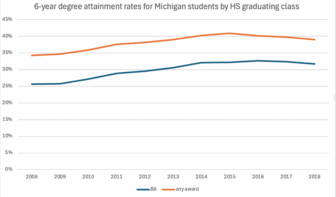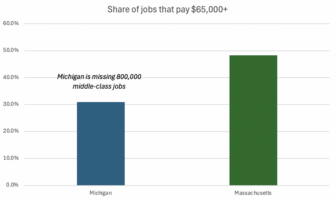I do a monthly post for the Grand Rapids Business Journal. Last month I wrote about the occupations and industries their latest 40 Under Forty worked in. Turns out these future leaders in West Michigan overwhelmingly don’t work for manufacturers or are in STEM based occupations. In fact, the nearly 150 nominees, at the undergraduate level, primarily have liberal arts degrees. Those are the kind of degrees that conventional wisdom increasingly predicts is a path to underemployment and wages too low to pay off so-called crushing student loans.
As I wrote: “The 40 Under Forty nominees work, of course, in the private sector, but also for nonprofits and government. And they overwhelmingly work in the knowledge-based sectors of the economy: health care and social assistance; education; management of companies; professional services; finance and insurance; and information. In terms of occupations, the 40 Under Forty nominees represent the broad diversity of opportunity in a 21st century economy. They also represent the continuing reality that the liberal arts remain a reliable path to success. Hardly any of these future leaders of the region work in STEM occupations.”
Both are good news for the future of the West Michigan economy. Successful regions are going to be those that are broadly diversified across all the knowledge-based services, rather than narrowly concentrated in a few industries. Certainly that is true for the two most prosperous Great Lakes regions: Chicago and Minneapolis.
This is a lesson that the state and nation need to learn. This narrow focus on STEM occupations, and even worse, the oft repeated message from too many of our political and business leaders that if you don’t get a four year degree in a STEM field you are better off going to a community college to become a machinist (or similar technical occupation) is bad for both students and the state’s and nation’s economic well being.
Do the nation and state need more people with math and science expertise? Of course. But that doesn’t mean we need fewer people with the kind of skills developed by getting degrees in fields other than engineering and the sciences. The only way to build a broad knowledge-based economy is to have a large talent pool with the widest variety of skills in plentiful supply.
Two recent articles explore why broader––rather than narrow occupation focused––college degrees, are good for our future well being. Both highly recommended:
In a terrific Wall Street Journal column entitled Why Focusing Too Narrowly in College Could Backfire, Peter Cappelli of the Wharton School makes the case why a broad liberal arts college education is good for the long term economic well being of students. The article is subtitled “Students are told learn the subjects that will best land them a job when they graduate. But that could be the worst thing they could do.”
The New York Times recently wrote about Indian business leaders starting a new liberal arts college. Why? As the Times writes: “Yet a group of successful professionals and entrepreneurs, some of them alumni of these universities, have come together to establish an alternative to what they say is an educational paradigm that overly emphasizes technical capabilities while neglecting vital skills like critical thinking, communications and teamwork.” (Emphasis added.)
West Michigan currently has too small of a talent pool — it has one of the lowest college attainment rates of metros with populations of 1 million or more in the country. So it’s good that the next generation of West Michigan leaders represented by this year’s Grand Rapids Business Journal’s 40 Under Forty class chose to follow their own passion with degrees and occupations that are not those selected as the future winners by government or the so-called experts. But it also is good for the future of metro Grand Rapids.
Lets hope all across Michigan––which also has too small a talent pool––students follow their own passion and earn degrees and enter occupations that are not those selected as the future winners by government or the so-called experts. It will be good for them and the future of Michigan.






